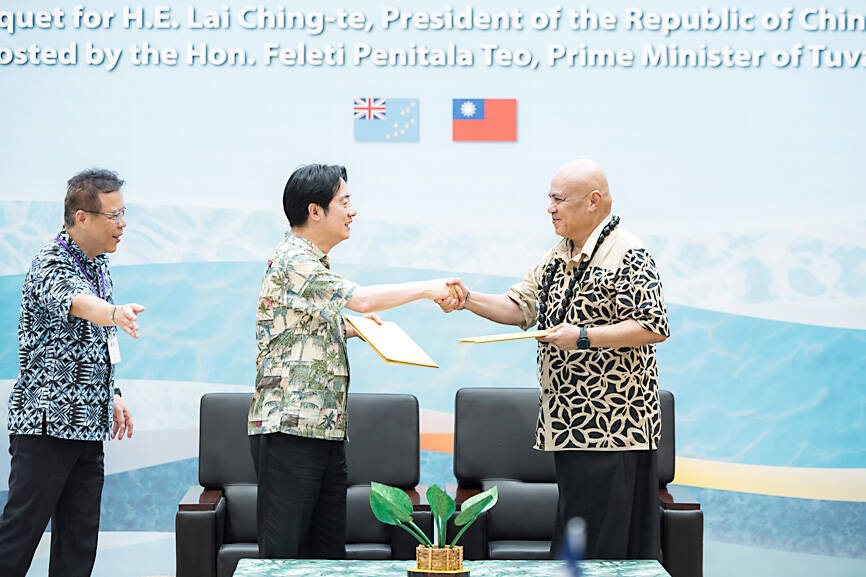President William Lai (賴清德) yesterday arrived in the Pacific nation of Tuvalu, with the two nations signing a joint communique on advancing their partnership.
Lai’s one-day trip to Tuvalu came ahead of a stopover in the US territory of Guam.
Earlier, he was in the Marshall Islands, where Marshallese President Hilda Heine expressed her government’s commitment to “remain a staunch ally” of Taiwan.

Photo courtesy of the Taiwan Presidential Office
Tuvalu and the Marshall Islands are among 12 UN member nations that recognize Taiwan diplomatically.
Lai smiled and waved as he stepped off the plane in Tuvalu, where he was greeted by Tuvaluan Prime Minister Feleti Teo, Governor-General Tofiga Vaevalu Falani, schoolchildren, an honor guard, and a traditional song and dance performance.
“When I disembarked and saw Tuvaluan students waving the national flags of our two countries, I strongly felt the people’s firm commitment to our diplomatic alliance,” Lai said through a translator.
Looking relaxed in a colorful shirt, and with a garland of pink and yellow flowers around his neck, Lai said he hoped Taiwan and Tuvalu can “expand our cooperation to even more areas, thereby further strengthening our diplomatic partnership.”
In a speech, Teo expressed “Tuvalu’s thanks for Taiwan’s contribution” to a pool of funds used by the government to buy a submarine Internet cable, as well as its financial support for climate action.
In a joint communique on “advancing the comprehensive partnership,” the two sides agreed to “reassess the ongoing bilateral cooperation projects in order to establish a more durable, lasting and mutually beneficial diplomatic relations.”
Teo was named prime minister in February, a month after an election that put the nation’s recognition of Taiwan in question.
During the election campaign, Tuvaluan lawmaker Seve Paeniu had floated the idea that the new government could review its Taiwan ties.
That set off speculation about a looming shift in policy, but the new government has vowed to keep up its “special” relationship with Taiwan.
China has expressed anger at Lai’s weekend trip to Hawaii on his way to three Pacific allies.
Lai, who spent the night in Guam, is making what are formally only stopovers.
However, he spent two days in Hawaii, where he met with the governor, gave speeches and visited a World War II memorial.
Security sources told reporters that China could stage new war games around Taiwan as early as this weekend in response to the trip.
Mainland Affairs Council Minister Chiu Chui-cheng (邱垂正) told reporters in Taipei yesterday that Lai’s trip to consolidate friendship with other countries was something that Taiwanese support.
However, “the Chinese communists threaten Taiwan with military hegemony, which I think is something our citizens do not agree with,” Chiu said. “This will only cause cross-strait relations to drift further and further away, and which will not be helpful to ties in the future.”
The international community should take China’s military drills and threats seriously, Chiu added.
Lai is to wrap up his week-long trip tomorrow with a visit to ally Palau.
Additional reporting by Reuters

ENDEAVOR MANTA: The ship is programmed to automatically return to its designated home port and would self-destruct if seized by another party The Endeavor Manta, Taiwan’s first military-specification uncrewed surface vehicle (USV) tailor-made to operate in the Taiwan Strait in a bid to bolster the nation’s asymmetric combat capabilities made its first appearance at Kaohsiung’s Singda Harbor yesterday. Taking inspiration from Ukraine’s navy, which is using USVs to force Russia’s Black Sea fleet to take shelter within its own ports, CSBC Taiwan (台灣國際造船) established a research and development unit on USVs last year, CSBC chairman Huang Cheng-hung (黃正弘) said. With the exception of the satellite guidance system and the outboard motors — which were purchased from foreign companies that were not affiliated with Chinese-funded

PERMIT REVOKED: The influencer at a news conference said the National Immigration Agency was infringing on human rights and persecuting Chinese spouses Chinese influencer “Yaya in Taiwan” (亞亞在台灣) yesterday evening voluntarily left Taiwan, despite saying yesterday morning that she had “no intention” of leaving after her residence permit was revoked over her comments on Taiwan being “unified” with China by military force. The Ministry of the Interior yesterday had said that it could forcibly deport the influencer at midnight, but was considering taking a more flexible approach and beginning procedures this morning. The influencer, whose given name is Liu Zhenya (劉振亞), departed on a 8:45pm flight from Taipei International Airport (Songshan airport) to Fuzhou, China. Liu held a news conference at the airport at 7pm,

Taiwan was ranked the fourth-safest country in the world with a score of 82.9, trailing only Andorra, the United Arab Emirates and Qatar in Numbeo’s Safety Index by Country report. Taiwan’s score improved by 0.1 points compared with last year’s mid-year report, which had Taiwan fourth with a score of 82.8. However, both scores were lower than in last year’s first review, when Taiwan scored 83.3, and are a long way from when Taiwan was named the second-safest country in the world in 2021, scoring 84.8. Taiwan ranked higher than Singapore in ninth with a score of 77.4 and Japan in 10th with

GRIDLOCK: The National Fire Agency’s Special Search and Rescue team is on standby to travel to the countries to help out with the rescue effort A powerful earthquake rocked Myanmar and neighboring Thailand yesterday, killing at least three people in Bangkok and burying dozens when a high-rise building under construction collapsed. Footage shared on social media from Myanmar’s second-largest city showed widespread destruction, raising fears that many were trapped under the rubble or killed. The magnitude 7.7 earthquake, with an epicenter near Mandalay in Myanmar, struck at midday and was followed by a strong magnitude 6.4 aftershock. The extent of death, injury and destruction — especially in Myanmar, which is embroiled in a civil war and where information is tightly controlled at the best of times —